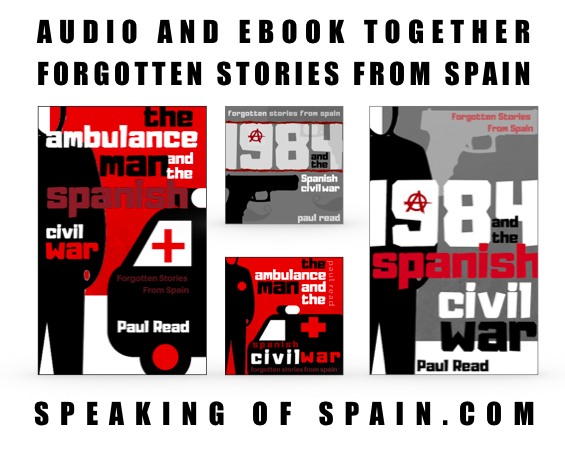|
One episode from the Spanish Civil War still remains relatively unknown: A episode of bravery and betrayal, dogmatism and defeat. It is brief story of Norman Bethune, the Canadian doctor, the “foreign spy” and man who came to help a city in exodus.  Try to imagine that the city of Malaga is to be evacuated overnight. 150.000 people will have to walk 200km along the N340 in search of a safe refuge whilst being pursued by Italian tanks, bombed by German aircraft and shelled by Rebel Nationalist ships. Men and women shot by planes or killed by blasts from the boats following them off-shore will be left at the roadside, innocent children abandoned to the chaos and inhumanity of adults at war. There will be little food, transport or fresh water. Nourished only by hope and driven by fear, exposed to the elements and to enemy fire, they will walk through the day and through the night. Many will be too weak to reach the safe port of Almería and survive only because a Canadian doctor comes to help. A doctor who will later be accused of spying and betrayal and will be unwillingly pushed out of Spain by the very people he had come to assist. (Read more after the slideshow...) The Story Begins With a City In Fear...
In the aftermath of the 1936 elections in Spain, the new government watched as overnight, villages and towns began to dismantle the old symbols of inequality in the country. The Manchester Guardian reported that in the new radical atmosphere of Malaga “only foreigners now wore ties”. Unfortunately, the absence of ties did little to deter Franco and his allies from throwing the country into a sudden and brutal civil war. When Only Foreigners Wore Ties Malaga Bites Back 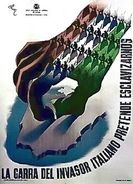 Italy Invades Spain Italy Invades Spain This story takes place in Malaga, a proud Andalusian city with radical roots; a city preparing itself for the long-overdue social, industrial and agrarian reforms so needed for the neglected provinces of the south. When the army rose up against the newly elected government, the broadly Republican malagueños resisted and after a few minor scuffles, the local military garrison was forced to retreat to its barracks. However, Malaga soon began to attract the interest of Franco who needed access to this strategically important port town. By the beginning of February 1937, Italians aiding Franco's troops had reached the outskirts of Malaga, and swiftly took control of the city. No Government Assistence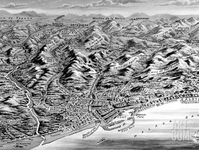 Malaga Port in 1936 Malaga Port in 1936 Without government assistance, Malaga’s defense collapsed before the professional armies on its outskirts. The republic had indeed failed the Andalusian city. The malagueños knew their city would fall and that massive reprisals and executions would inevitably follow. And indeed over 4.000 executions would take place in the city after occupation. Terrified, isolated and abandoned, malagueños knew that there remained only one solution for over a 100.000 of them. La Caravana de la Muerte 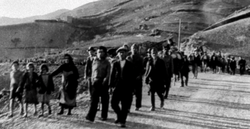 The Road to Almeria The Road to Almeria Cut off to the east and the north. they had to flee their home city and to flee in the one direction that remained open to them: the coastal road west to Almería. Today, accounts of the exodus are few. Survivors remember it as the “caravan of death”. They survived on sugar cane, oranges and the blind hope that they would reach safe ground in the republican city of Almería. But the journey was a long one. Many fell victim to the endless rounds of ammunition from the airplanes flying low above their heads or the shells targeting them from just out at sea. Many, too tired to keep up, fell to the back and in turn, fell victim to the reprisals from the Italian tanks and soldiers following them out of the city. 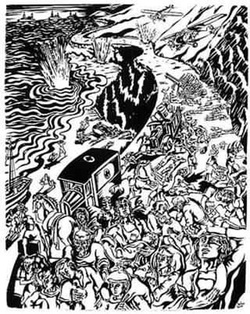 La Caravana de la Muerte La Caravana de la Muerte Though help was not forthcoming from the government, other forces had been organising resistance. The International Brigades were recruiting volunteers from across the world. In Canada 1.600 volunteers came and one of these was a radical and charismatic doctor called Norman Bethune. He went first to Madrid in November 1936 to co-ordinate and organise the medical help sent by the Canadian government. During this time in Madrid, he brilliantly organised the first ever mobile health unit. It was an innovation that would also carry crucial blood donations to the front lines - an operation that would save the lives of thousands over the next few years. As a foreigner in a strange city, Bethune did things his own way. He would make maps to help him re-find locations; he met and had a passionate affair with a Swedish, blond journalist; he got drunk and criticised officials that tried to tell him how to do his job. Like Orwell in Barcelona, his strong opinions and personal perspective would have repercussions later in the war. After Madrid, Bethune drove up to Barcelona with his work companions: Hazen Size and Thomas Worsley. There they stocked up with an ambulance full off donated blood and then headed south to Malaga in the hope of arriving at the city before it fell to Nationalist troops. The "Ambulance Man" ArrivesThe End of the Line 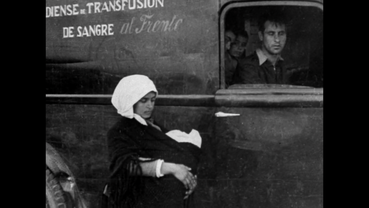 Hazen Size with the ambulance full of passengers Hazen Size with the ambulance full of passengers As the ambulance passed Almería and onto the coastal road to Malaga, the three companions came across the front of the procession. Children without footwear were crying in pain due to their swollen and blistered feet. As they drove further on, they came across the bulk of the procession. A serpentine line that filled the whole width of the road and continued as far as the eye could see – at least 30 kilometres of endless bodies dragging themselves ever onwards. Towards the end of the line were the remains of the military defenders in retreat. They warned Bethune that Malaga had fallen and the Italians were close behind them. Bethune and his companions emptied the ambulance to cram in 30 to 40 people per trip. and worked for four days and four nights to carry the helpless victims of war to the city of Almeria. Almería and the Scar on His Heart 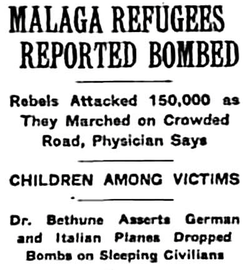 Newspaper Report Newspaper Report As the bulk of the procession arrived in Almería and the population of the city doubled with the number of the refugees, the long feared bombing of the city began again. The bombs fell everywhere, residential barrios, commercial centres and wherever the refugees tried to hide. The Malaga exodus, the Almería bombings and the heroic role of Norman Bethune and his companions have combined to become one of the great forgotten stories of the civil war. Bethune was finally labelled a suspect and a collaborator with a "fascist spy" by the communists who disagreed with his methods and his criticisms of the discipline they ere enforcing on the medical teams. The"fascist spy" was a Swedish lover he had known in Madrid, who was found carrying maps that Bethune had drawn up to help him distribute blood in the city. It was a concocted accusation, but enough of an excuse to purge him from the country. Bethune disillusioned left the country, saying that Spain would always be: ”a scar on my heart”. FORGOTTEN STORIES FROM SPAIN: THE AMBULANCE MAN 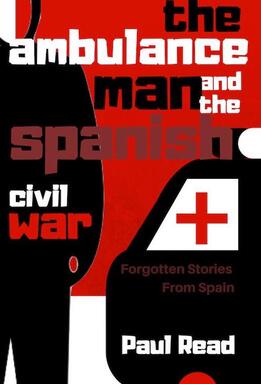 Listen to the author read the full story Listen to the author read the full story Bethune eventually returned to Canada before heading to China where he would become a national hero, remembered to this day by Mao as a man who gave his life for the health of others. Read more on:
THE FORGOTTEN STORIES FROM SPAIN SERIES...Listen to samples of each audio book and discover more about the complete series from the author here. 17/2/2014 04:19:35 am
So true that official histories are not to be swallowed whole. Facts are either conveniently doctored or buried altogether. The only truth to be trusted is that which comes from ordinary people, but the code of silence is chilling.
Paul Read
17/2/2014 10:31:14 am
I was amazed to hear in the adjoining documentary that his name rates in the top 5 most well know figures in Chinese history. The order goes something like Mao...someone....someone...Bethune...someone.....Amazing for a man relatively still unknown in his own country.
Paul Read
17/2/2014 10:32:09 am
That's a great description - almost want to add it to the article :) 5/3/2014 11:22:50 am
Like Paul Read I did not know what had happened in Malaga during the Civil War until I began to research for my novel set in February 1937, SPANISH LAVENDER. That was when I came across Norman Bethune - a remarkable man who gave hope to so many terrified people. Another book that throws light on those days is Malaga Burning by Gamel Woolsey (the wife of Gerald Brennan).
karen heaps
20/1/2016 11:55:03 pm
I am trying to get hold of a hard copy of Forgotten stories: The Ambulance man & te Spanish Civil war. - no luck anywhere- please help- thanks karen heaps vancouver Comments are closed.
|
StoreBooks
Videos Audio |
PDFs to Download |
|
